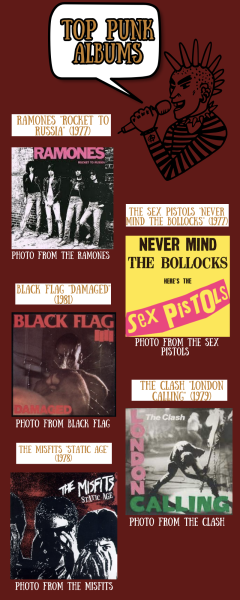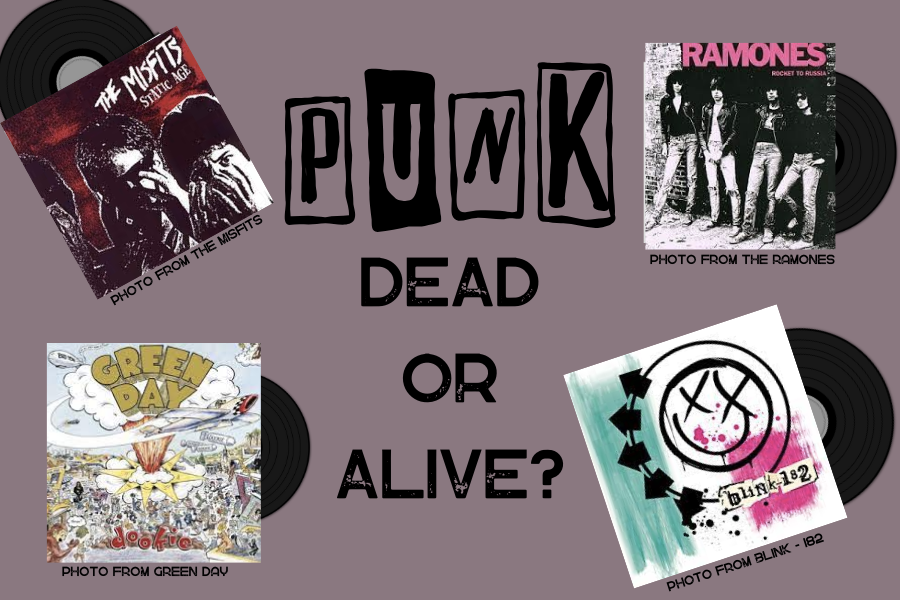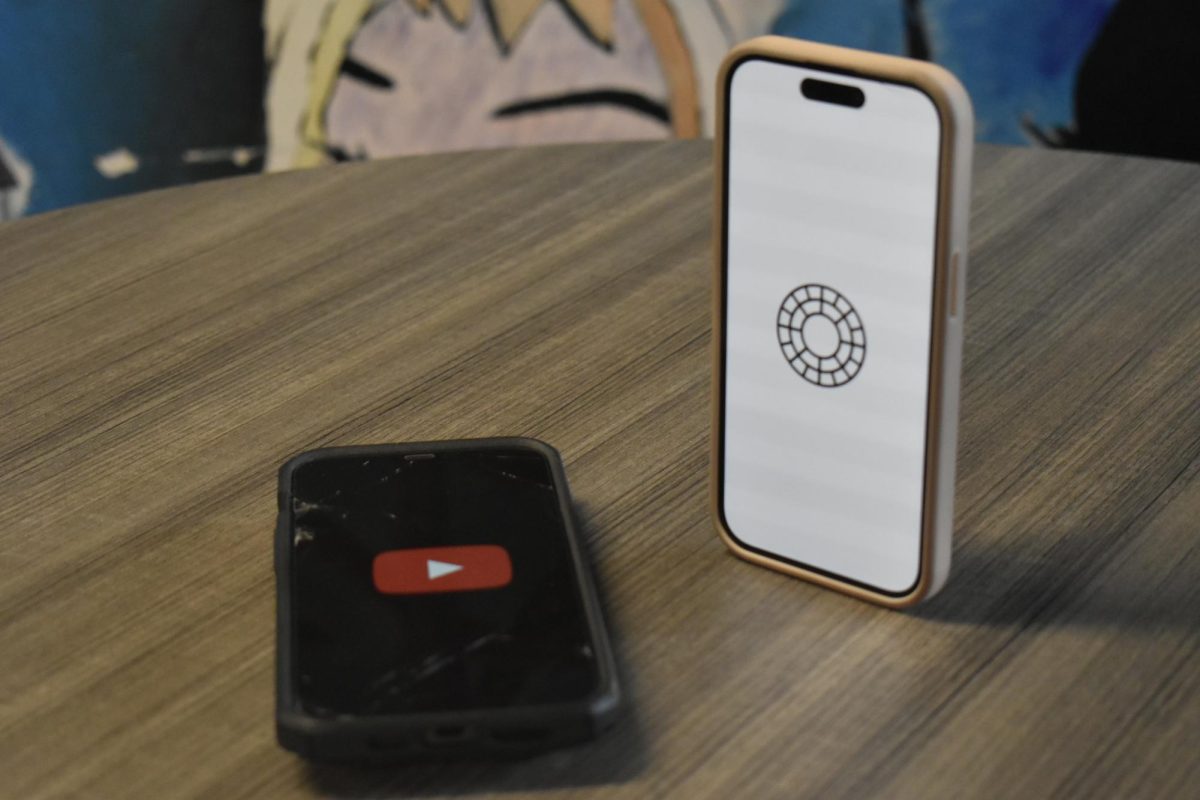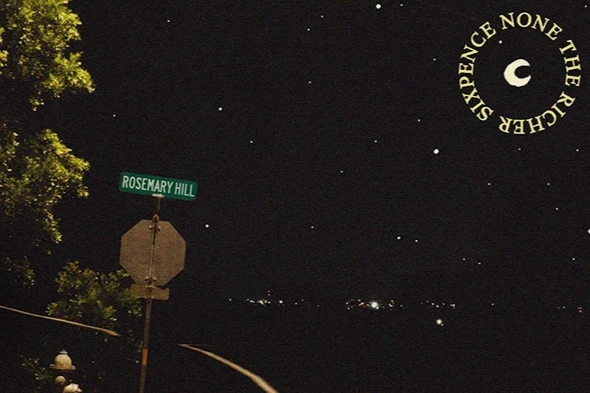The infamous and unapologetic genre of punk rock music became popular in the late ã70s amongst teens; people either loved it or saw it as music for delinquents. Today, the boisterous movement has been silenced and debate has ensued on whether punk rock is simply a distant memory.ô
Punk was born out of rebellion against expectations by the rich that made lower classes feel out of place in society. The so-called ãoutsidersã or ãrebelsã began wearing chains as accessories along with eccentrically dyed hair, multiple self-inflicted piercings, dirty studded leather jackets and scuffed-up combat boots. Musicians cranked up their amps, took amphetamines and banged out fast songs about alienation and destroying the failed government system. The Ramones, Sex Pistols and Black Flag are just some of the names from this era that helped trademark punk into the blunt statement it was. Punk was thriving, and for decades, it was one of the most prominent honest cultural forces widely available.
Making Punk Mainstreamô
Itãs been argued that punk has been dead since 1994. The alternative rock genre grunge had just died with the biggest rock band in the world, Nirvana, after lead singer Kurt Cobain committed suicide. If there was any question on who would be the successor to Nirvana, punk band Green Day raised their muddy hands. That year, the band released their successful junior album ãDookieã and caught the attention of the media after their infamous mud fight with the crowd at Woodstock 94.ô
Prior to Green Day, punk bands were not receiving radio play or being signed to major label deals. Older punks wanted to disown Green Day as punk and blame Green Day for killing punk due to the fact that they made their style of music mainstream. Being mainstream was the last thing that elder punks wanted, as they feared ãposersã ã people acting in a false way to impress others ã would ruin the genre and movement. Despite being one of Green Dayãs biggest inspirations, Sex Pistols lead singer Johnny Rotten completely ripped on Green Day on the Steve Jones radio show in 1996.ô
During his interview, Rotten declared that Green Day didnãt have to go through the certain hardships that he and the Sex Pistols had to and that the young band was just playing dress up, putting on a false image and were handed everything in their careers.
The statement made by the English punk singer was not accurate. Green Day gained a large punk following when they were just 18 years old and were entirely self-made. Furthermore, Green Day has always paid homage to their idols and recognized their humble place in punk.ô
In response to the criticism, boisterous Green Day frontman Billie Joe Armstrong clapped back at Rotten in SPIN magazine in 1997. In the article, Armstrong reminds Rotten that even though the Sex Pistols inspired Green Day, without Green Day the Sex Pistols wouldnãt have been relevant enough to do their reunion tour nor would have a new generation found Rottenãs band. Without Green Day making punk mainstream, itãs very possible punk would have drifted away into a forgotten genre. Social studies teacher Mel Trotier acknowledges this rivalry and Green Dayãs success ã agreeing Green Day ultimately helped keep punk alive.ô
ãJohnny Rotten is a jerk. His whole thing is, ãI just hate everything!ã Because of all of that, he’s got this huge chip on his shoulder. Itãs very true what Green Day is saying, that they wouldnãt exist without the Sex Pistols, but without Green Day bringing punk back into the mainstream people would not have gone back and been like, ãWhere’d that come from? Oh, the Sex Pistols. Well, let’s bring Johnny Rotten back,ãã Trotier said. ãIt could definitely be argued that [Rotten] was riding on Green Dayãs coattails, so [Rotten] should probably shut his mouth about that kind of stuff.ã
Many punk fans say Rotten is a bitter old man who was responsible for inflicting the fear of selling out onto punks and invoking violence in the community. But selling out isnãt bad. In ways, it shows a band has made it. Green Day is the sellout band, to the point where Armstrong changed the lyrics to ãBurnoutã from ãIãm not growing up, Iãm just burning outã to ãIãm not being punk, Iãm just selling out.ã Armstrong changed a song about lack of interest in anything to a snarky, self-aware joke. But as Fat Mike of NOFX told Viceland in 2021, Green Day didnãt sell out punk. Instead, they were playing their kind of music and it finally got popular, after being underground for 30 years.ô
One definition cannot define punk. Everyone has their own definition, even punks themselves, which is one of the most deadly things in the movement. Punks are too caught up with saying what is or is not punk and saying who or who is not punk, rather than keeping their movement alive, safe and relevant. Subgenres like pop-punk, which is looked down upon, drew new listeners like English teacher Kaleb Schumer into punk. Though Schumer is more interested in the pop-leaning side of the genre, he still has respect for the more traditional type of punk music.
ãWhen I think of punk, unfortunately, I see pop-punk like blink-182 and Green Day. People are into the music they were into as a teenager, and thatãs what I listened to. Thatãs my version of punk, mostly because they were against things that I was dealing with,ã Schumer said.ô
Older punks who were around when hardcore bands like Ramones, Misfits and Black Flag owned the scene completely disowned pop-punk from the genre, mainly because the sound pop-punk bands made was more slow-paced in comparison to the intensity that punk had branded onto itself.ô
But I donãt think punk died in the ã90s. It was good to see new people like Armstrong be considered the face of punk. It made sense, as he came from a background similar to what the old-school punks had gone through and was fighting for the same causes. Unlike other punk bands, Green Day wasnãt trying to be the next Ramones or the next Sex Pistols: they were being themselves. They were doing their style of punk and because it didnãt sound exactly like a carbon copy of the Ramones straightforward lyrics or didnãt have the anger that Black Flag projected, old school punks werenãt interested. Especially since Green Dayãs style of music was gaining mainstream recognition, it declassified them as punk. Yet when punks try and classify what is or isnãt punk, they are basically contradicting their mantra of including those who feel excluded in society.ô
ãThe downside of punk is that sometimes it is actively excluding others because [punks] have been excluded themselves. This is a contradictory thing in and of itself, but punk is essentially trying not to sound like anything else. If you listen to the radio, it’s all happy songs, and punk is trying to ã no pun intended ã ãrage against the machine.ã So, punkãs not always going to sound how people want it to sound,ã said Schumer.
ô
New Wave of Punkô
In recent years, the loud and unapologetic sound punk has trademarked has caused a lot of commotion, since the hardcore scene has practically disappeared. Although bands like Green Day, The Stooges and blink-182 are a few iconic punk bands trying to keep the movement alive by releasing new music, more often than not, their new album releases tend to leave fans unsatisfied with the production as the authenticity or rebellion that blasted out of past records is gone.ô
In new punk bands, there isnãt much of a creative drive or rebellion: itãs just new bands copying the style and sound of iconic bands. This has been recently seen with The Interrupters, as they have copied the famous ska-punk band Rancid. Down to the way the guitar chords are structured and the way singer Aimee Allen annunciates her syllables ã itãs easy to spot the obvious inspiration of Rancid. Being influenced by a band is extremely common in music, but what The Interrupters are doing sounds more like theyãre mocking the punk legends with a characterless impression. Now, young listeners like senior Will Brown are familiar with punk, but have never been impressed with it.ô
ãPunk is disappointing, misdirected and overdone. One of my favorite bands of all time is Metallica and the bassist, Cliff Burton, was very inspired by the Misfits, but it’s just not for me,ã Brown said. ãFor me, the Misfits are like [when] you meet someone and donãt like something about them, but you can’t really describe why. Thatãs the Misfits to me. There are a lot of really good punk riffs that get ruined by people who canãt sing.ã

Punk has not ever been about talent, who could sing the best or who could have the most intricate guitar solo ã it was about the shock factor. Punk wanted to make people upset by their vile language and actions. For decades, punk did just that, but now society has such censorship and is numb to so many things that punk would seem obsolete and be canceled in a heartbeat. During an interview with SPIN magazine, legendary Glenn Danzig of The Misfits declared that cancel culture is what is preventing another punk explosion. This is famously seen with Henry Rollins of Black Flag and Rollins Band, as listeners didnãt agree with his self-expression in his writing and spoken word shows. Donãt get me wrong, Rollins is famously intimidating due to his stoic demeanor and has a more grim look on things, but he also went through a lot during his childhood and while touring with Black Flag. The media disliked his grotesque phrasing and explanations of some of his past traumas and canceled him, labeling him as ãtoo insensitive.ã Due to this, Rollins stepped away from mainstream media and rarely makes TV appearances; instead, he focuses more on his writing with his own independent label, spoken word tours and visiting countries in need of support. This is something I understand: it would get upsetting to be shunned by the media for speaking your truth ã especially when youãre not harming anyone.
Punk rock was not only a type of music, but also had to do with the culture around it such as fashion, literature and anti-establishment ideas. Senior Inaya Chisti argues that the reason why punk is such a transformative genre is due to punks speaking out against societal issues and older generations are passing down their knowledge to the younger generation.ô
ãThe older generation is keeping [punk] alive by passing the knowledge of music continuously speaking out on issues to their kids, to raise awareness for things they care about and showing them bands like Green Day and Rage Against The Machine,ã Chisti said.ô
While the idea of punk and its dark past has engraved itself into history, there isnãt that same drive that there once was before. Maybe it is fear due to new societal norms, lack of passion or even talent, but in the end, that once-passionate drive that inspired so much is gone.ô
Guitar and orchestra teacher Ed Sandheinrich argues that punk cannot be killed just because it looks a little different and more relaxed with pop-punk, and that the polarizing movement is not something that can be dismissed lightly.ô
ãI think as long as there’s someone willing to question things, then punk’s not dead. It may not sound or look like Black Flag or Bad Brains anymore, but it’s hard to kill an idea or an attitude,ã Sandheinrich said.ô
ô Though I agree that itãs hard to kill an attitude, itãs equally as hard to stand for an idea or attitude when nobody in this generation wants to continue a punk attitude. All that people are doing now is making an attempt of trying to sound like past bands. There arenãt any new bands that are coming out with their own sound and are keeping the same defiant punk attitude. Though bands are still rebelling against some societal norms, the fear of being canceled is holding a new movement back.ô
The truth is, the movement silenced itself into being just a cool memory due to a lack of alternative motivation from the new generation. The punk movement forming into a souvenir from past decades is unfortunate since a lot of good music and political change came from punk. Although, if it was still standing today, the genre wouldnãt be inviting or welcoming to the new generation. New bands would continuously get pushed and branded as pop-punk or ãimitatorsã of their favorite classic punk band, and ultimately, punk history would just repeat itself.ô
Times have changed since the early ã70s. Punk would not elicit the same sentiment since now almost everyone feels alienated and isolated in one way or another. Due to quarantine, itãs not much of a statement to feel alienated from a group. Though punkãs popularity and relevance has faded, its impact completely flipped music on its head. So, the next time you are going through a hard time, maybe skip ãAnti-Heroã by Taylor Swift and throw on ãNervous Breakdownã by Black Flag instead. It could rock your whole perspective.




![There are more than 20 open cardio machines at Crunch Fitness. I enjoyed the spacious environment at Crunch, a sentiment that was shared by sophomore Sanjana Daggubati. ã[Going to] Crunch Fitness was the right decision because [it] feels more professional. Crunchãs workers are laid back, but not to the point where they don't care,ã Daggubati said.](https://pwestpathfinder.com/wp-content/uploads/2025/09/IMG_5242-1-1200x900.jpg)

![Various empty Kit Kat wrappers crowd the desk, surrounded by scoring sheets. While production of Kit Kat flavors in the U.S. is limited, Nestlûˋ, the owner of Kit Kat, manufactures hundreds of unique flavors in Japan, including the flavors ocean salt and passion fruit. ãI thought there [were] some interesting flavors, and a lot of them were really unexpected,ã senior Elle Levesque said.](https://pwestpathfinder.com/wp-content/uploads/2025/09/image-2.png)


![Pantoneãs selection of the 2025 Color of the Year is revealed: Mocha Mousse. Ceramics teacher Ashley Drissell enjoys this yearãs selection. ãMaybe itãs the name but [Mocha Mousse] reminds me of chocolate and coffee. It makes me hungry. Itãs very rich and decadent,ã Drissell said.](https://pwestpathfinder.com/wp-content/uploads/2025/02/DSC_0015-1200x800.jpg)



ryan • Feb 12, 2024 at 7:40 am
punk will never die as long as sopo,mark winter and drew crimmins are still alive
Will Gonsior • Sep 28, 2023 at 12:25 pm
I will never not comment on these music articles, I love them too much! Peak punk for me is my favorite band, U2, realizing they’d grown too full of themselves and “chopping down the Joshua Tree” by making a punk record. The resulting “Achtung Baby” is joyfully sarcastic while retaining the aggression and anger of the punk genre. It’s one of my favorite albums of all time.